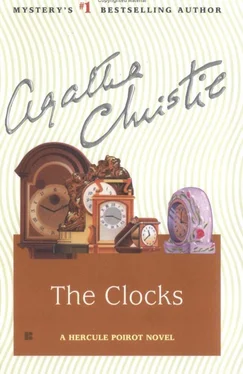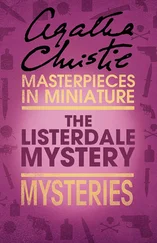Agatha Christie - The Clocks
Здесь есть возможность читать онлайн «Agatha Christie - The Clocks» весь текст электронной книги совершенно бесплатно (целиком полную версию без сокращений). В некоторых случаях можно слушать аудио, скачать через торрент в формате fb2 и присутствует краткое содержание. Год выпуска: 2004, ISBN: 2004, Издательство: Berkley, Жанр: Классический детектив, на английском языке. Описание произведения, (предисловие) а так же отзывы посетителей доступны на портале библиотеки ЛибКат.
- Название:The Clocks
- Автор:
- Издательство:Berkley
- Жанр:
- Год:2004
- ISBN:ISBN-13: 978-0425173916
- Рейтинг книги:5 / 5. Голосов: 1
-
Избранное:Добавить в избранное
- Отзывы:
-
Ваша оценка:
- 100
- 1
- 2
- 3
- 4
- 5
The Clocks: краткое содержание, описание и аннотация
Предлагаем к чтению аннотацию, описание, краткое содержание или предисловие (зависит от того, что написал сам автор книги «The Clocks»). Если вы не нашли необходимую информацию о книге — напишите в комментариях, мы постараемся отыскать её.
The Clocks — читать онлайн бесплатно полную книгу (весь текст) целиком
Ниже представлен текст книги, разбитый по страницам. Система сохранения места последней прочитанной страницы, позволяет с удобством читать онлайн бесплатно книгу «The Clocks», без необходимости каждый раз заново искать на чём Вы остановились. Поставьте закладку, и сможете в любой момент перейти на страницу, на которой закончили чтение.
Интервал:
Закладка:
‘So far-the plan is obvious, but what puzzled me was why our murderer took for granted that there would be no real identification. If the man had no family, there are at least landladies, servants, business associates. That led me to the next assumption-this man was not known to be missing. A further assumption was that he was not English, and was only visiting this country. That would tie in with the fact that the dental work done on his teeth did not correspond with any dental records here.
‘I began to have a shadowy picture both of the victim and of the murderer. No more than that. The crime was well planned and intelligently carried out-but now there came that one piece of sheer bad luck that no murderer can foresee.’
‘And what was that?’ asked Hardcastle.
Unexpectedly, Poirot threw his head back, and recited dramatically:
‘For want of a nail the shoe was lost,
For want of a shoe the horse was lost,
For want of a horse the battle was lost,
For want of a battle the Kingdom was lost,
And all for the want of a horse shoe nail.’
He leaned forward.
‘A good many people could have killed Mr Curry. But only one person could have killed, or could have had reason to kill, the girl Edna.’
We both stared at him.
‘Let us consider the Cavendish Secretarial Bureau. Eight girls work there. On the 9th of September, four of those girls were out on assignments some little distance away-that is, they were provided with lunch by the clients to whom they had gone. They were the four who normally took the first lunch period from 12.30 to 1.30. The remaining four, Sheila Webb, Edna Brent and two girls, Janet and Maureen, took the second period, 1.30 to 2.30. But on that day Edna Brent had an accident quite soon after leaving the office. She tore the heel off her shoe in the grating. She could not walk like that. She bought some buns and came back to the office.’
Poirot shook an emphatic finger at us.
‘We have been told that Edna Brent was worried about something. She tried to see Sheila Webb out of the office, but failed. It has been assumed that that something was connected with Sheila Webb, but there is no evidence of that. She might only have wanted to consult Sheila Webb about something that had puzzled her-but if so one thing was clear. She wanted to talk to Sheila Webbaway from the bureau.
‘Her words to the constable at the inquest are the only clue we have as to what was worrying her: She said something like: “I don’t see how what she said can have been true.” Three women had given evidence that morning. Edna could have been referring to Miss Pebmarsh. Or, as it has been generally assumed, she could have been referring to Sheila Webb. But there is a third possibility-she could have been referring to Miss Martindale.’
‘Miss Martindale? But her evidence only lasted a few minutes.’
‘Exactly. It consisted only of the telephone call she had received purporting to be from Miss Pebmarsh.’
‘Do you mean that Edna knew that it wasn’t from Miss Pebmarsh?’
‘I think it was simpler than that. I am suggesting that there was no telephone call at all.’
He went on:
‘The heel of Edna’s shoe came off. The grating was quite close to the office. She came back to the bureau. But Miss Martindale, in her private office, did not know that Edna had come back. As far as she knew there was nobody but herself in the bureau. All she need do was tosay a telephone call had come through at 1.49. Edna does not see the significance of what she knows at first. Sheila is called in to Miss Martindale and told to go out on an appointment. How and when that appointment was made is not mentioned to Edna. News of the murder comes through and little by little the story gets more definite. Miss Pebmarsh rang up and asked for Sheila Webb to be sent. But Miss Pebmarsh says it was not she who rang up. The call is said to have come through at ten minutes to two. But Edna knows that couldn’t be true. No telephone call came through then. Miss Martindale must have made a mistake-But Miss Martindale definitely doesn’t make mistakes. The more Edna thinks about it, the more puzzling it is. She must ask Sheila about it. Sheila will know.
‘And then comes the inquest. And the girls all go to it. Miss Martindale repeats her story of the telephone call and Edna knows definitely now that the evidence Miss Martindale gives so clearly, with such precision as to the exact time, is untrue. It was then that she asked the constable if she could speak to the inspector. I think probably that Miss Martindale, leaving the Cornmarket in a crowd of people, overheard her asking that. Perhaps by then she had heard the girls chaffing Edna about her shoe accident without realizing what it involved. Anyway, she followed the girl to Wilbraham Crescent. Why did Edna go there, I wonder?’
‘Just to stare at the place where it happened, I expect,’ said Hardcastle with a sigh. ‘People do.’
‘Yes, that is true enough. Perhaps Miss Martindale speaks to her there, walks with her down the road and Edna plumps out her question. Miss Martindale acts quickly. They are just by the telephone box. She says, “This is very important. You must ring up the police at once. The number of the police station is so and so. Ring up and tell them we are both coming there now.” It is second nature for Edna to do what she is told. She goes in, picks up the receiver and Miss Martindale comes in behind her, pulls the scarf round her neck and strangles her.’
‘And nobody saw this?’
Poirot shrugged his shoulders.
‘They might have done, but they didn’t! It was just on one o’clock. Lunch time. And what people there were in the Crescent were busy staring at 19. It was a chance boldly taken by a bold and unscrupulous woman.’
Hardcastle was shaking his head doubtfully.
‘Miss Martindale? I don’t see how she can possibly come into it.’
‘No. One does not see at first. But since Miss Martindale undoubtedly killed Edna-oh, yes-only she could have killed Edna, then she must come into it. And I begin to suspect that in Miss Martindale we have the Lady Macbeth of this crime, a woman who is ruthless and unimaginative.’
‘Unimaginative?’ queried Hardcastle.
‘Oh, yes, quite unimaginative. But very efficient. A good planner.’
‘But why? Where’s the motive?’
Hercule Poirot looked at me. He wagged a finger.
‘So the neighbours’ conversation was no use to you, eh? I found one most illuminating sentence. Do you remember that after talking of living abroad, Mrs Bland remarked that she liked living in Crowdean because she had a sister here. But Mrs Bland was not supposed to have a sister. She had inherited a large fortune a year ago from a Canadian great-uncle because she was the only surviving member of his family.’
Hardcastle sat up alertly.
‘So you think-’
Poirot leaned back in his chair and put his fingertips together. He half closed his eyes and spoke dreamily.
‘Say you are a man, a very ordinary and not too scrupulous man, in bad financial difficulties. A letter comes one day from a firm of lawyers to say that your wife has inherited a big fortune from a great-uncle in Canada. The letter is addressed to Mrs Bland and the only difficulty is that the Mrs Bland who receives it is the wrong Mrs Bland-she is the second wife-not the first one-Imagine the chagrin! The fury! And then an idea comes. Who is to know that it is the wrong Mrs Bland? Nobody in Crowdean knows that Bland was married before. His first marriage, years ago, took place during the war when he was overseas. Presumably his first wife died soon afterwards, and he almost immediately remarried. He has the original marriage certificate, various family papers, photographs of Canadian relations now dead-It will be all plain sailing. Anyway, it is worth risking. They risk it, and it comes off. The legal formalities go through. And there the Blands are, rich and prosperous, all their financial troubles over-
Читать дальшеИнтервал:
Закладка:
Похожие книги на «The Clocks»
Представляем Вашему вниманию похожие книги на «The Clocks» списком для выбора. Мы отобрали схожую по названию и смыслу литературу в надежде предоставить читателям больше вариантов отыскать новые, интересные, ещё непрочитанные произведения.
Обсуждение, отзывы о книге «The Clocks» и просто собственные мнения читателей. Оставьте ваши комментарии, напишите, что Вы думаете о произведении, его смысле или главных героях. Укажите что конкретно понравилось, а что нет, и почему Вы так считаете.












